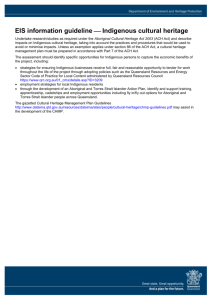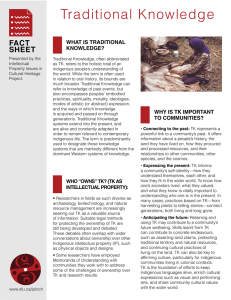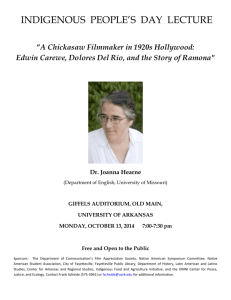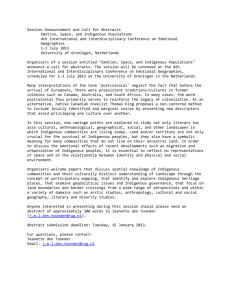Invited - University of Victoria
advertisement
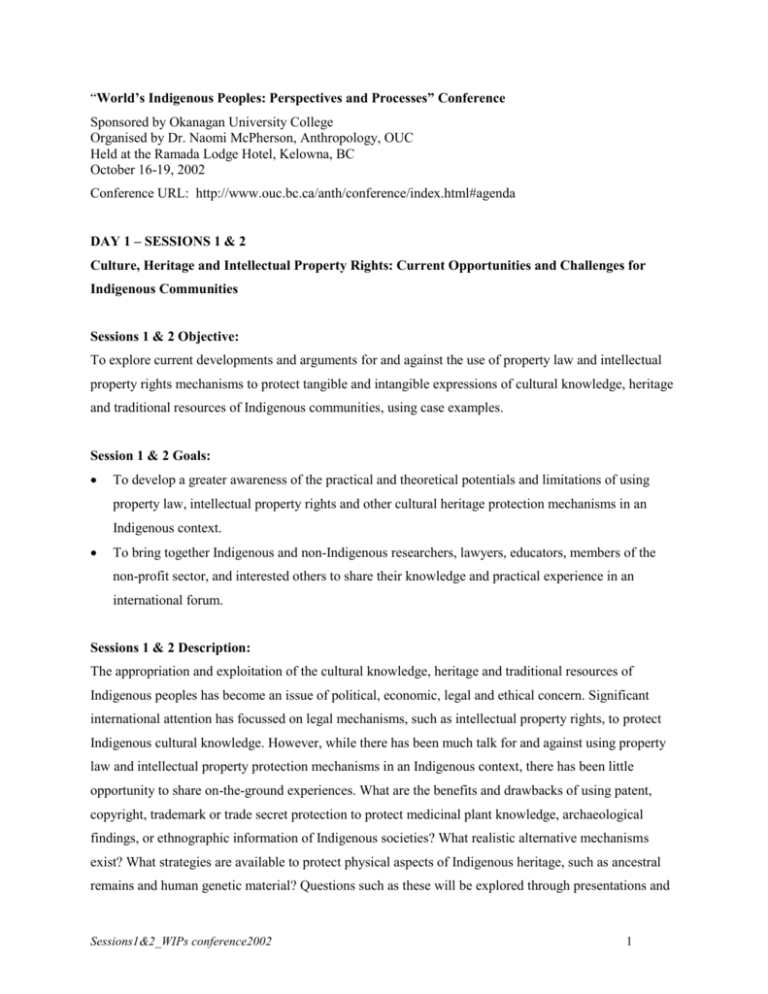
“World’s Indigenous Peoples: Perspectives and Processes” Conference Sponsored by Okanagan University College Organised by Dr. Naomi McPherson, Anthropology, OUC Held at the Ramada Lodge Hotel, Kelowna, BC October 16-19, 2002 Conference URL: http://www.ouc.bc.ca/anth/conference/index.html#agenda DAY 1 – SESSIONS 1 & 2 Culture, Heritage and Intellectual Property Rights: Current Opportunities and Challenges for Indigenous Communities Sessions 1 & 2 Objective: To explore current developments and arguments for and against the use of property law and intellectual property rights mechanisms to protect tangible and intangible expressions of cultural knowledge, heritage and traditional resources of Indigenous communities, using case examples. Session 1 & 2 Goals: To develop a greater awareness of the practical and theoretical potentials and limitations of using property law, intellectual property rights and other cultural heritage protection mechanisms in an Indigenous context. To bring together Indigenous and non-Indigenous researchers, lawyers, educators, members of the non-profit sector, and interested others to share their knowledge and practical experience in an international forum. Sessions 1 & 2 Description: The appropriation and exploitation of the cultural knowledge, heritage and traditional resources of Indigenous peoples has become an issue of political, economic, legal and ethical concern. Significant international attention has focussed on legal mechanisms, such as intellectual property rights, to protect Indigenous cultural knowledge. However, while there has been much talk for and against using property law and intellectual property protection mechanisms in an Indigenous context, there has been little opportunity to share on-the-ground experiences. What are the benefits and drawbacks of using patent, copyright, trademark or trade secret protection to protect medicinal plant knowledge, archaeological findings, or ethnographic information of Indigenous societies? What realistic alternative mechanisms exist? What strategies are available to protect physical aspects of Indigenous heritage, such as ancestral remains and human genetic material? Questions such as these will be explored through presentations and Sessions1&2_WIPs conference2002 1 panel discussions led by Indigenous and non-Indigenous scholars and practitioners working on cultural heritage and intellectual property protection in fields such as ethnobotany, archaeology, anthropology, ethnography and Aboriginal law. Time: This all-day symposium will be comprised of two half-day sessions of 3.5 hours each on Oct 16th. The two sessions will be interrelated but part 1 (Frameworks and International Perspectives) will have an international emphasis while part 2 (Canadian Issues, Applications and Alternatives) will have a stronger applied and regional focus on cases in Canada, particularly British Columbia. Session 1 & 2 Organiser: Dr. Kelly Bannister Research Associate, POLIS Project on Ecological Governance Faculty of Law and School of Environmental Studies University of Victoria Email: kel@uvic.ca Phone: 250-472-5016 Speakers List: SESSION 1 (morning) 8:30-12:00 Frameworks and International Perspectives Mary Louie, Elder, Okanagan Indian Band. Opening blessing 1. Kelly Bannister, Research Associate, POLIS Project on Ecological Governance. Introduction and Background to Sessions 1 and 2 2. David Stephenson Jr., Anthropologist, Lawyer and Chair, Rocky Mountain Human Rights Law Group. International Human Rights Law and Indigenous Peoples' Intellectual Property Rights. 3. Jo Render, Program Officer, First Peoples Worldwide/First Nations Development Institute, Washington, DC. There Are No Saints Here: Non-Governmental Organisations and the Protection of Indigenous Heritage. 4. Paul Reynolds* and Cherryl Waerea-i-te-rangi Smith *School of Communication, Simon Fraser University, Vancouver, BC The Challenge from Indigenous Communities to Biotechnology: Maori responses to genetic engineering 5. R. Hokulei Lindsey, Graduate Student, William Richardson School of Law University of Hawai’i. Reclaiming Hawaii: Toward the Protection of Native Hawaiian Cultural and Intellectual Property Sessions1&2_WIPs conference2002 2 6. Sangeeta Udgaonkar, Advocate and Infosys Scholar, National Law School of India University. Traditional Knowledge Databases and Registers: Protection or Piracy (IN ABSENTIA) 7. Brian Noble, Sociology & Social Anthropology, Dalhousie University Strong Tradition and the Global "Knowledge Economy": The problem of integrity, locality, and effectiveness 8. Rex Dalton, West Coast Correspondent (San Diego), Nature. Shaping the Global Debate on Indigenous Issues: The power of the press SESSION 2 (afternoon) 1:30 –5:00 Canadian Issues, Applications and Alternatives 1. Jock Langford, Biodiversity and Convention Office, Environment Canada. The Protection of Traditional Knowledge: Issues and Processes from a Canadian Perspective. 2. Linda Kitchikeesic, Executive Director, Centre for Traditional Knowledge, Ottawa and Pamela Kupeuna, Environment and Natural Resources Canada, Indian and Northern Affairs Canada National Aboriginal Database: Traditional Knowledge 3. George Nicholas, Department of Archaeology & Archaeology Program Director, SFU-SCES, Kamloops, BC Copyrighting the Past? Potential Use of Intellectual Property Rights to Augment Cultural Heritage Protection in Archaeology. 4. John Jules, Cultural Resource Manager, Kamloops Indian Band, Secwepemc First Nation, Kamloops, BC. Cultural Resources Adaptive Management: A Process to Protect Cultural Heritage. 5. Verna Miller, T’mixw Research, Nicola Tribal Association, Merritt T'mix Research and Custodianship of Traditional Knowledge 6. Catherine Bell, Faculty of Law, University of Alberta, Edmonton AB. Protection and Repatriation of Aboriginal Cultural Property. 7. Geraldine Manson, Elders Cultural and Language Coordinator, Snuyneymuxw First Nation, Nanaimo, BC. Protection of Sacred Sites 8. Martin Bunton, Postdoctoral Fellow, Department of History, University of Victoria. Property Rights, Traditional Rights, and the Natural Environment: Opportunities and Challenges in the management of resources in Clayoquot Sound. 9. Kelly Bannister, Research Associate, POLIS Project on Ecological Governance. Closing Remarks Sessions1&2_WIPs conference2002 3
